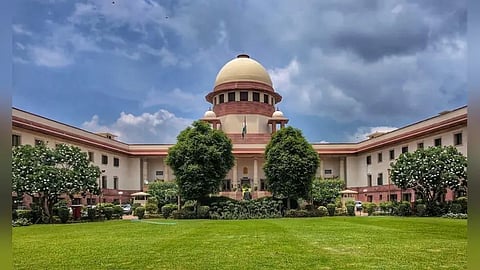
- Home
- Live Blog
- Breaking News
- Top Headlines
- Cities
- NE News
- Sentinel Media
- Sports
- Education
- Jobs

New Delhi: Solicitor General Tushar Mehta told a five-judge apex court bench on Thursday that the President would seek the Supreme Court’s opinion on whether a state government can file a writ petition challenging a decision taken by the Governor or the President on a Bill, given the immunity they enjoy under the Constitution’s Article 361 from being answerable to any court for acts done in the exercise and performance of the powers and duties of their office.
The special bench, headed by Chief Justice of India (CJI) B.R. Gavai, is hearing the reference made by the President under Article 143 of the Constitution in the aftermath of the apex court verdict in the Tamil Nadu Bills case.
In an earlier hearing, the bench, also comprising Justices Surya Kant, Vikram Nath, P.S. Narasimha, and Atul S. Chandurkar, had proposed not to advise the President on whether the exercise of constitutional discretion by a Governor on Bills is justiciable when Article 361 bars judicial review of gubernatorial actions.
Suggesting that the issue could be kept open for adjudication in a future case, it had asked the Solicitor General to take instructions from the Centre on whether the question is being pressed in the Presidential reference.
After obtaining instructions, Mehta stated that the President would seek the Supreme Court’s opinion on the scope of a state government filing a writ petition to challenge an action of the Governor or the President, in view of the immunity provided under Article 361.
The Centre’s law officer said that the Constitution’s Article 32, which enables the filing of writ petitions for the enforcement of fundamental rights, can be invoked only in cases of violation of such rights.
A state government, being a constitutional body, has no fundamental rights of its own and functions only as the guardian of citizens’ fundamental rights, he submitted.
Mehta argued that while a state government may represent its citizens, this does not entitle it to approach the apex court under Article 32 alleging violations of fundamental rights. He added that a writ petition filed directly by a state government before the Supreme Court would not be maintainable.
The SG also submitted that Article 32 of the Constitution empowers individuals to move the highest court of the land against the government, adding that in cases involving poor or disadvantaged petitioners, an NGO may represent them.
Disputes between a state government and the Centre are to be adjudicated under Article 131 of the Constitution, through an original suit before the Supreme Court, he said, arguing that the apex court, on its own, cannot issue directions to the President or the Governor regarding a pending Bill. (IANS)
Also Read: National Green Tribunal can’t order an ED probe, rules Supreme Court
Also watch: